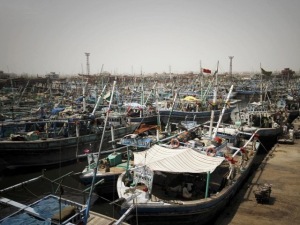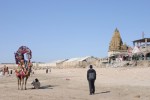 It is not possible to draw a line in the water, and the maritime borders between India and Pakistan are no more defined than are maritime borders anywhere in the world.
It is not possible to draw a line in the water, and the maritime borders between India and Pakistan are no more defined than are maritime borders anywhere in the world.
Today, satellite navigation systems allow pinpoint precision — but not all vessels have them and poor fishermen, often illiterate never mind computer-savvy, accidentally fall foul of the international border. Few — if any — from either country, violate the borders with espionage in mind — they are just trying to make a living. Currently, according to reports, there are 226 of our fishermen in Indian jails, some of them since 1993, and many of them have completed their sentences but have yet to be released.
On April 11, 2014 the Supreme Court urged the Indian authorities to act in a humanitarian way and release, at least, those that had completed their sentences. For its part, the Indian Supreme Court issued a judgment in March 2010 seeking the release of fisherfolk that Pakistan has detained. Pakistan has already released 471 Indian fisherfolk but the Indian response was less than generous — they released just 66. This source of tension is largely artificial, and both sides need to acknowledge that the poor fisherfolk of both countries do not and never have, presented a security threat. The fisherfolk are unlikely to be embracing the wonders of modern technology anytime soon, but are always going to need to ply their trade and feed their families. They are not seeking to provoke an international incident and it is usually obvious to the coastguard ships of both sides that they are not discovering a boatload of spies or seaborne terrorists — just simple fisherfolk. Of all the problems faced by India and Pakistan this is, perhaps, the one most susceptible to an early solution.
The two countries should ensure future plan of action with deciding about clear demarcation of the sea territories to avoid arresting fishermen or seizing their boats.
Majority of the detained fishermen belong to the poor families and their children have been facing hardships to run their family affairs.
It is not only the border force hunting fishermen and their vessels the government agencies here also target fishermen in the name of security concerns during their way to the open sea, disrupting their livelihood activities.
 The fishermen are living in horrible situation without basic facilities. They need help to raise the voice and convey their message to the parliamentarians in the provincial and national assemblies.
The fishermen are living in horrible situation without basic facilities. They need help to raise the voice and convey their message to the parliamentarians in the provincial and national assemblies.
For the poor families the arrest of their bread earners is not less than disaster. They are vulnerable to face hardships. In fact at this time these families need relief goods, and the humanitarian institutions should extend helping hand to support these families so that they may feel safe and secured.
They are in dire need to run their family affairs. They are worried about their children who do not go to schools in the absence of their fathers and guardians. They are waiting to receive their loved ones. They need ration and health cover.
There are 14 island villages, which do not have access to basic facilities, including water, health and education. It seems these island communities have been discarded by the state authorities despite the fact that their votes are valuable. They have voted to elect some representatives but irony is that to whom these people should ask that whose people they are?
Why they are being treated like this. They are law-abiding citizens and they deserve to be protected in terms of providing livelihood.